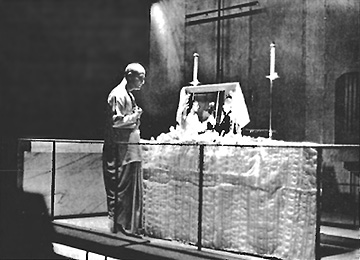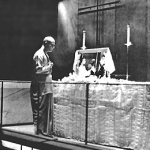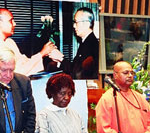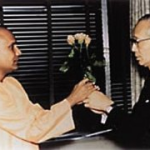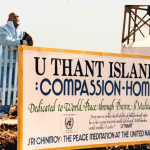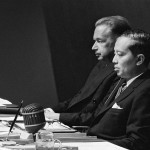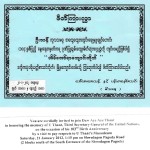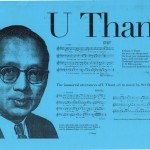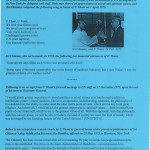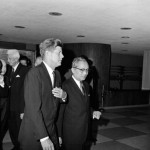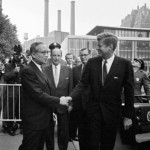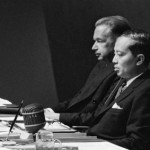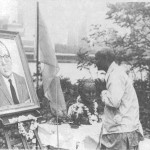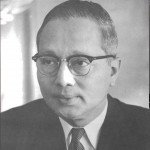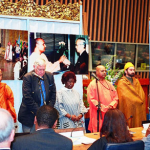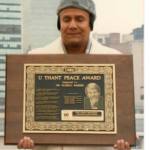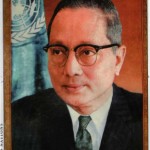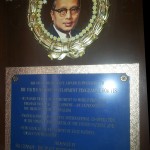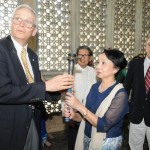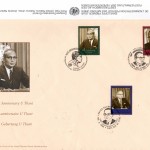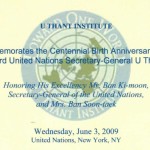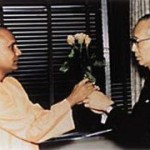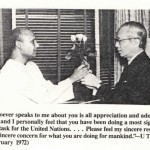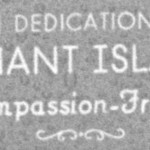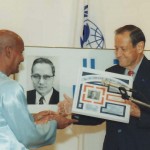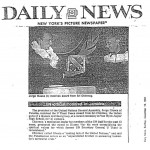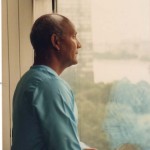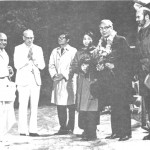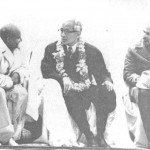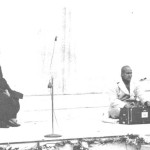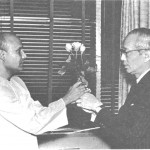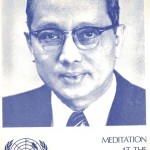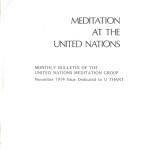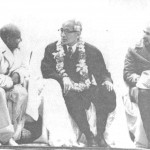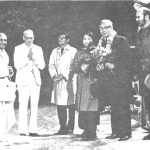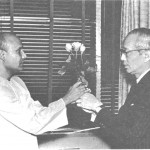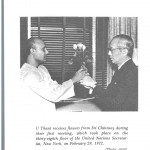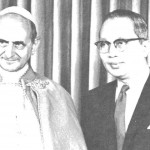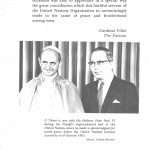U Thant and Sri Chinmoy – Spiritual values, Oneness, Acceptance
Filed under Significant events & meetings | Thoughts from the UN community. | Tributes and Expressions of appreciation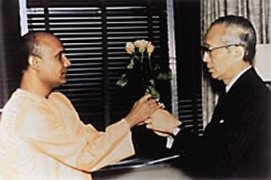 U Thant and Sri Chinmoy ~
U Thant and Sri Chinmoy ~
In 1968 , Sri Chinmoy lead a meditation for Peace and gave a talk “The Song Universal” for the UN Community.
A year and half later, in 1970, Secretary-General U Thant invited Sri Chinmoy to serve as leader of a meditation group which would regularly meet at UN Headquarters to pray and meditate for world peace.
Under Sri Chinmoy’s guidance the scope of the meditation group expanded to include a wide variety of activities, in service to the United Nations.
The late Secretary-General U Thant, himself a’ life-long practitioner of meditation, appreciated Sri Chinmoy’s work and encouraged his efforts to renew the spiritual idealism of the world body in order to revitalise its activities.
“Whoever speaks to me about you is all appreciation and admiration.” U Thant told Sri Chinmoy in a meeting at Headquarters in February 1972, “and I personally feel that you have been doing a most significant task for the United Nations. Please feel my sincere respect and sincere concern for what you are doing for mankind.”
The warmth and mutual respect which characterized the relationship between U Thant and Sri Chinmoy continued to increase until the passing of the former Secretary-General.
See 2017 update at :
to be also updated / replicated here
U Thant and Sri Chinmoy – messages
==========================================================================
U Thant’s last message to Staff: Importance of Spiritual Values
-
- “I would attach greater ‘importance to moral qualities or moral virtues ..intellectual qualities or intellectual virtues — moral qualities, like love, compassion, understanding, tolerance, the philosophy of live and let live, the ability to understand the other man’s point of view, which are the key to all great religions.
- And above all, I would attach the greatest importance to spiritual values,…faith in oneself, the purity of one’s inner self which to me is the greatest virtue of all. With this approach, with this philosophy, with this concept alone, we will be able to fashion the kind of society we want, the kind of society which was envisaged by the founding fathers (of the UN)
-
- For full message see end note n[i].)
- See also: U Thant’s message about spiritual values at premier of play “Siddhartha becomes the Buddha” in Harrison NY, 25 May 1973″ Excerpt: “I feel very strongly, as some of my friends know, that only by the practical application of the teachings of great religious leaders, particularly the development of the moral and the spiritual aspects of life as Sri Chinmoy has stressed in the play—love, compassion, tolerance, and the philosophy of live-and-let-live, modesty and even humility–that only with this approach, only with this method, will we all be able to fashion the kind of society we want, a truly moral society, a decent society, a livable society, which is the goal of all great religions.” (REFERENCE)
-
[i] Excerpt from : Secretary General U Thant, 17 Dec 1971, page 7, of UN/STB/281 farewell message to staff:
-
“ I have certain priorities in regard to virtues and human values. As far as I am concerned, an ideal man, or an ideal woman, is one who is endowed with four attributes, four qualities, -physical qualities, intellectual qualities, moral qualities and spiritual qualities.
Of course it is very rare to find a human being who is endowed with all these qualities but, as far as priorities are concerned,
- I would, attach greater importance to intellectual qualities over physical qualities.
- I would attach still greater importance to moral qualities over intellectual qualities. It is far from my intention to denigrate intellectualism or intellectual qualities but I am just trying to define my priorities.
- I would attach greater ‘importance to moral qualities or moral virtues over intellectual qualities or intellectual virtues — moral qualities, like love, compassion, understanding, tolerance, the philosophy of live and let live, the ability to understand the other man’s point of view, which are the key to all great religions.
- And above all, I would attach the greatest importance to spiritual values, spiritual qualities. I deliberately avoid using the term “religion”. I use the term deliberately “spirit” I have in mind the spiritual virtues, faith in oneself, the purity of one’s inner self which to me is the greatest virtue of all.
With this approach, with this philosophy, with this concept alone, we will be able to fashion the kind of society we want, the kind of society which was envisaged by the founding fathers 26 years ago. Secretary General U Thant, 17 Dec 1971, page 7, of UN/STB/281
-
-
==========================================================================
Sri Chinmoy: “Oneness”; acceptance of others “faith in God as one’s own”
The Message of the United Nations
The outer message of the United Nations is peace.
The inner message of the United Nations is love.
The inmost message of the United Nations is oneness.
– Dag Hammarskjold Auditorium, 04 Jan 1973
Unity and Oneness
Unity is the temple.
Oneness is the shrine.
Unity is not oneness.
A bud is not a flower. (REFERENCE + link)
World Peace and Harmony
World Peace, world Harmony,
are not mere dictionary words
they are realities:
divine realities, supreme realities. (ADD REFERENCE + link)
Acceptance of Other’s Faith in God
Our spiritual life firmly and securely establishes the basis of unity in diversity.
Spirituality is not mere hospitality to others’ faith in God.
It is the absolute recognition and acceptance
of their faith in God as one’s own.
(end note has link to full quote)[i].
Spirituality is not merely tolerance.
It is not even acceptance.
It is the feeling of universal oneness. [ia]
For overview of more than 3 decades
-
-
-
- see: “Sri Chinmoy’s work at the United Nations: spirituality and the power of silence” by Pedersen, Kusumita P., in Cross Currents[ii].
-
-
[i] What Is Spirituality? : http://www.srichinmoylibrary.com/books/0003/1/12
[ia] Spirituality is not merely tolerance…: God’s Hour -Daily meditations. August 20th. 1986; AUM Publications New York.
[ii] Publisher: Association for Religion and Intellectual Life. For good part of full text: http://www.freepatentsonline.com/article/Cross-Currents/239197496.html
More details :
From U Thant to Sri Chinmoy:
“I have been hearing about you from many, many people. Whoever speaks to me about you is all appreciation and admiration, and I personally feel that you have been doing a most significant task for the United Nations. It has been a great privilege for me to see you. Please feel my sincere respect and sincere concern for what you are doing for mankind.”
February 29th, 1972, Meeting at the United Nations Headquarters, New York
“You have indeed instilled in the minds of hundreds of people here the moral and spiritual values which both of us cherish very dearly. I shall always cherish the memorable occasion of our meeting at the United Nations.” April 10th, 1972, Letter
“Sri Chinmoy has done a most remarkable job in presenting the play in simple language understandable even to the uninitiated. His stress on the basic characteristics of Buddhism-on compassion, love, renunciation, peace-should stimulate the thoughts of leaders of men and leaders of thought everywhere…I feel very strongly that only by the practical application of the teachings of great religious leaders, particularly the development of the moral and spiritual aspects of life as Sri Chinmoy has stressed in the play – love, compassion, tolerance, the philosophy of live-and-let-live, modesty and even humility-that only with this approach will we all be able to fashion the kind of society we want, a truly moral society, a decent society, a livable society, which is the goal of all great religions…”
May 25th, 1973, U Thant offered his comments following the premier performance of Siddhartha Becomes the Buddha by Sri Chinmoy, Harrison, New York
From Sri Chinmoy to U Thant
“Divinity’s Smile and Humanity’s Cry”
“U Thant, U Thant,
We love your silence-soul,
We loved your compassion-heart.
Your world-harmony role
Challenged ignorance-dart.
UN pilot supreme,
You treasured perfection-dream.”
“U Thant’s life of humility was the result of his heart’s nobility. His heart of nobility was the result of his soul’s unparalleled divinity.
In the inner world, he was God’s Promise, God’s Promise to the outer world. In the outer world he was man’s confidence, man’s confidence in becoming a dedicated instrument of the inner world.”
“Simplicity was U Thant’s life.
Sincerity was U Thant’s mind.
Purity was U Thant’s heart.
His was the approach of serene
And illumined dignity.”
gallery:
- uthant-sri-chinmoy-photo-meditation-church-center-uthant-passing-2007
- uthant-sri-chinmoy-photo-meet-flower-silence-1972
- 1985-visit
- 1959-oct-01-hammarskjold-uthant-14th-Session-UN-General-Assembly-un-photo-60999.jpg
- uthant-sri-chinmoy-photo-meditation-church-center-uthant-passing-2007
- uthant-handout-with-quote-ckg-songs-ocr_Page_1
- uthant-handout-with-quote-ckg-songs-ocr_Page_2
- un-photo-uthant-kennedy-1963-sep-20-189363
- un-photo-uthant-kennedy-189364
- 1959-oct-01-hammarskjold-uthant-14th-Session-UN-General-Assembly-un-photo-60999.jpg
- uthant-award–1991-sep-malta-de-marco-pres-ga_P_0-iii-uthant
- 1986-11-nov-06-russell-barber-receives-uthant-peace-award-sri-chinmoy-presents-
- 1985-04-mar-19-u-thant-award-undp-plaque
- 20120121-uthant-103rd-anniver_143-masolem
- 1994-09-Sep-20-U-Thant-Peace-Award-J-Grant-Exd-UNICEF-ckg-photos_Page_4-crp.jpg 58kb
- bu-scpmaun-1974-nov-u-thant_Page_86-sri-chinmoy-u-thant.
- bu-scpmaun-1974-nov-u-thant_Page_83-at-buddha-play
- sri-chinmoy-u-thant
- bu-scpmaun-1974-nov-u-thant_Page_01-crp-2
- sri-chinmoy-u-thant
- uthant-sri-chinmoy-photo-meet-flower-silence-1972-feb-29 102kb
